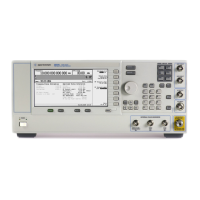98 Chapter 3
Basic Digital Operation
Using Waveform Markers
Marker Point Edit Requirements
Before you can modify a waveform segment’s marker points, the segment must reside in volatile
memory (see “Loading Waveform Segments from Non–volatile Memory” on page 96).
In the dual ARB player, you can modify a waveform segment’s marker points without playing the
waveform, or while playing the waveform in an ARB modulation format.
In an ARB modulation format, you must play the waveform before you can modify a segment’s
marker points.
Saving Marker Polarity and Routing Settings
Marker polarity and routing settings remain until you reconfigure them, preset the signal generator,
or cycle the PSG power. To ensure that a waveform uses the correct settings when it is played, set
the marker polarities or routing (RF Blanking and ALC Hold), and save the information to the file
header (page 80). This is especially important when the segment plays as part of a sequence because
the previously played segment could have different marker and routing settings.
ALC Hold Marker Function (For Instruments with serial prefixes >=US4722/MY4722)
While you can set a marker function (described as
Marker Routing on the softkey label) either before or
after you set marker points (page 104), setting a marker function before setting marker points may
cause power spikes or loss of power at the RF output.
Use the ALC hold function by itself when you have a waveform signal that incorporates idle periods,
or when the increased dynamic range encountered with RF blanking (page 109) is not desired.
The ALC hold marker function holds the ALC circuitry at the average (RMS) value of the sampled
points set by the marker(s). For both positive and negative marker polarity, the ALC samples the RF
output signal (the carrier plus any modulating signal) when the marker signal goes high:
The marker signal has a minimum of a two sample point delay in its response relative to the
waveform signal response. To compensate for the marker signal delay, offset marker points from the
waveform sample at which you want the ALC sampling to begin.
NOTE Because it can affect the waveform’s output amplitude, do not use the ALC hold for longer
than 100 ms. For longer time intervals, refer to “Setting Power Search Mode” on page 283.
Positive: The signal is sampled during the on marker points.
Negative The signal is sampled during the off marker points.

